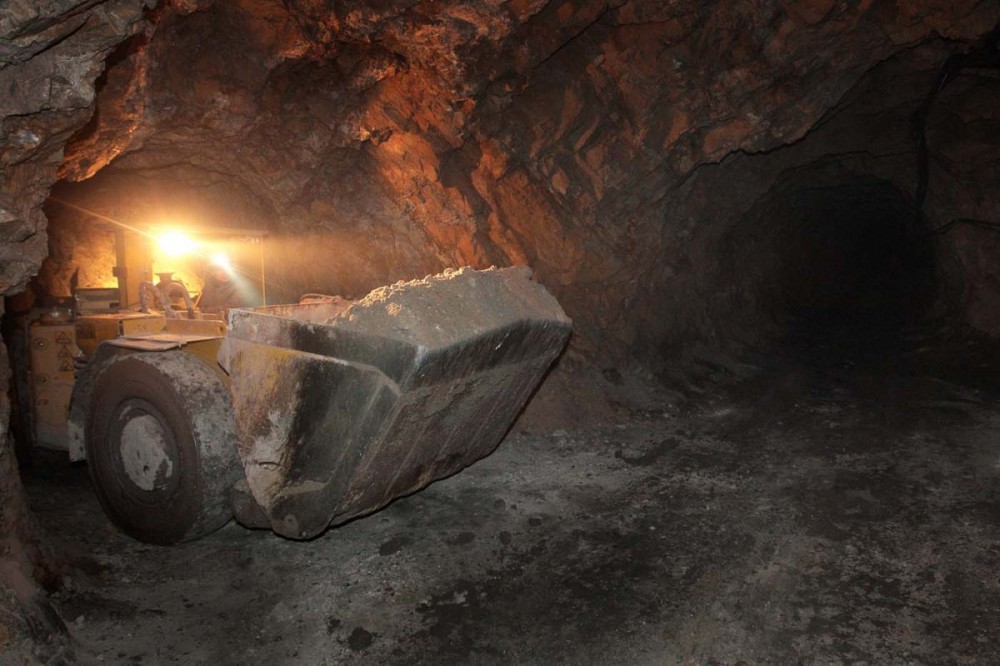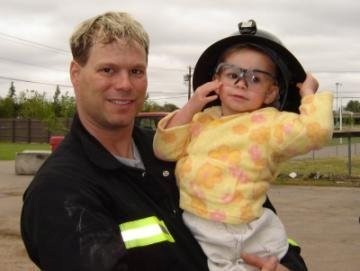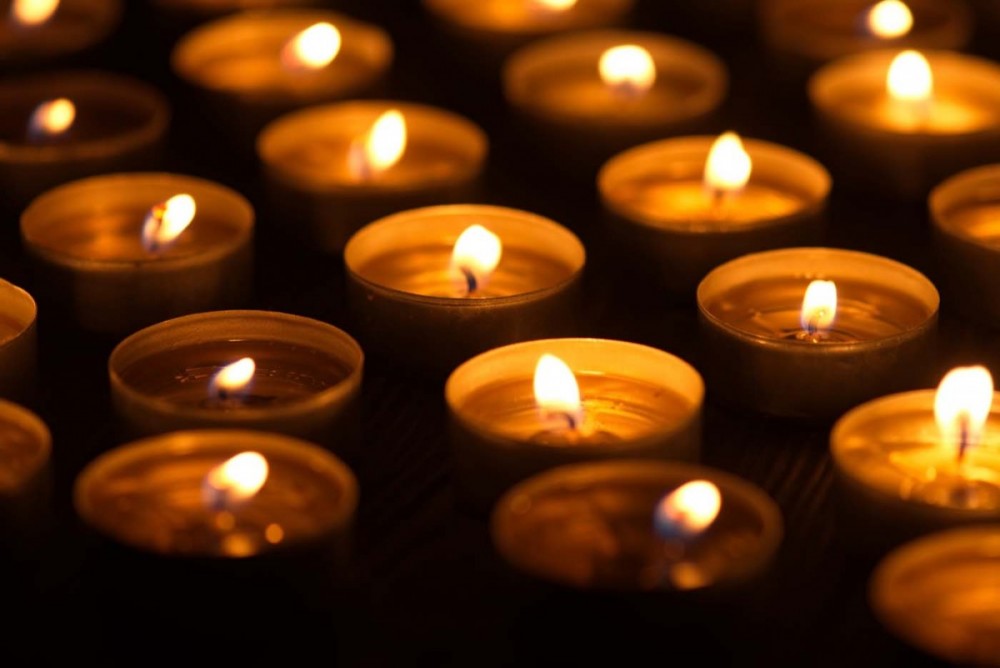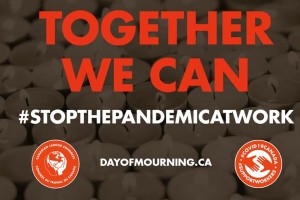Today I am writing to you about my experiences as a unionized worker, and the April 28th Day of Mourning.
It’s not easy.
When I started my working career at the mine, I really knew nothing of the reason for the April 28th Day of Mourning. My previous place of employment was a long-term care home. While I never had a co-worker die at work, there was a lot of mourning over lost loved ones.
I started my career at the mine in February of 1997. It was cold, and I had no idea about what a sheltered working career I had had about death on the job, until then. I was hired as a labourer, doing everything I was asked to do. It wasn’t easy and left me tired at night. I was 27 and physically able to do it all, but could I take it mentally?
Being 27, I Just Wanted a Job
I was a temporary employee in 1997. Being a temporary employee meant that you had full benefits, but you had no seniority or pension benefits. Being 27, the pension wasn’t an issue. I just wanted a job. I was hired in February and September came, yet still no full-time position. Two of the guys who were hired before me had just been made permanent in July, so it had to be soon I thought.
Lorne McMillan was a loadout worker, a husband, and a dad. Lorne’s job was to drive the Trackmobile. A Trackmobile is a piece of equipment that moves the railcars down the tracks — to get them on the right track, or after they have been loaded with potash. Lorne worked a lot of overtime for the company, driving loader as well as loading cars when required. He worked so much OT that he got the nickname “Scabber.”
Lorne liked working in loadout and providing for his family. When I was assigned to go to loadout to load cars, it was Lorne who helped me out and gave me some tips on how to get the job done. I was glad it was Lorne, as I was a new employee and not everyone in loadout was happy to see a new guy. He treated me how he would want to be treated.
It was September of 1997 when Lorne died on the job. He was making sure the gates were closed on the cars before loading them when he had a heart attack. His co-workers saw Lorne had fallen and called the supervisor on the radio. Lorne was taken to the hospital in the ambulance. It was later communicated to the workforce that he had died that day.
I started this article by talking about my temporary status, for a reason. When Lorne died, I was made a permanent employee. I think about that a lot. Sure, maybe I would have been made permanent some time down the road, but this was my vacancy.

PHOTOGRAPH: ISTOCK.COM / MARICIC
The Day of Mourning really means something to the mining community. Like I mentioned, I had worked in a long-term care home. I saw a lot of people come in, and I saw a lot of people leave. Those people died, but it didn’t really affect me the way that the death of a co-worker affects you. I felt bad, but I did need to work and make a living. I continued to work at the mine. I was glad to have my job and finally have permanent status.
James Rothecker was a mine-operations employee. He had a family who loved him. He had a girlfriend he loved. It was January in 1999 when I got the call at home. James Rothecker, 22, had died at work. There had been a rock fall underground. It was a weird time I thought. Here the world was worried about Y2K, that everything was going to fall apart at the end of the millennium, and now James was dead. That really was my thought. People worried about so much that may or may not happen, and here was something real that had just happened, and I hoped everyone knew. But they didn’t.
That night I went to a crew safety supper. Here I was, an employee who was barely permanent, at a safety supper, celebrating safety on the day that James died, and I was sad. Our general foreman who was at the supper made a statement about James’s death. No one knew. But I knew: I had gotten the call from a co-worker, but I kept it quiet. I didn’t know what to say. I said nothing.
After that supper, I bought a case of beer and stopped at my former co-worker’s house. I had worked with her at the long-term care home and just wanted to sit with someone. I had family around, but I just wanted to say hi. Maybe I missed my job where no one got killed. We had a beer and the news came on. She asked how it was going, and I was sad. I told her that I had known James from his time on surface mining. He just wanted to work hard and get along with his co-workers. James was always trying to please others, and he was a good guy. A young guy. James’s truck was still in the parking lot for a few days after that. I parked next to it.
The Foreman Was Talking When The Phone Rang
It was months later when we were having a safety meeting in the control room at work. The general foreman was talking when the phone rang. I was close to the phone, so I answered it. It was a woman, and she wanted to speak with someone in charge. I handed the phone to the general foreman, and the crew listened as he talked. He seemed shocked, and he wasn’t the kind to be shocked. When he hung up, he looked at the crew and said, “That was James Rothecker’s sister. She wanted to speak to the son of a bitch who sent James underground.” Truth is, James bid for the job; he wasn’t sent. I talked to him when he was looking for a crew to make a career with, after spending time in the mill and in loadout. I wished him luck.
It was a few months later when I was wearing a company shirt at a bar and a woman asked me if I knew James. I was sad. I told her James was a good guy and it made me sad what had happened to him. She was James’s girlfriend. She was sad too. She was also mad that it seemed like no one cared. I told her we all cared and that, while not everyone was at the funeral, many had been there the day before at the visitation.

Gord Hiebert and his daughter at an underground mine rescue competition in 2005. PHOTOGRAPH: LISA HIEBERT
That is when I really started to pay attention to the Day of Mourning. It wasn’t the International Workers’ Memorial Day then, but it was still just as sad. Every year candles are lit for the people who have died on the job from workplace illnesses or injuries. Each candle is someone’s loved one. Parent, spouse, sibling, friend. Someone cared about them. That sadness will not leave. Lorne, James . . . and it isn't over. People go to work and not all of them make it home. That stays with me.
Jason Shulist was a mine-operations employee. Jason had a wife and a baby. It was Family Day, February 17, 2014. I was awake early; I don’t sleep in. I was at home with my family. I got a phone call from a co-worker. Jason Shulist, 31, had died at work. The roof had collapsed in the area of the mine he was working in. Damn. Jason was a young guy with a young child. Age doesn’t matter but. . . . Damn. I had never worked with Jason but I knew the face. I was sad again. Here was another guy that was providing for his family and didn’t make it home. Every Family Day I think of Jason. It might not be on the exact date that he died, but I always remember he died on Family Day. That is not a day to die at work.
When you hear of International Workers’ Memorial Day, or the Day of Mourning, as we call it here in Canada, remember, it’s not just Lorne McMillan, James Rothecker, and Jason Shulist. There are many others. People who go to work and don’t come home. People who don’t just die from their work, but die because of their work.
Though the pandemic has restricted what we can do, I will always remember this: In Saskatoon at the Day of Mourning ceremony, the United Steelworkers and members of the Saskatchewan Potash Council attend. The lights are dimmed during the ceremony and we wear our hard hats and cap lamps. It is a moving part of the ceremony and one I am proud to be a part of.
Mourn for the dead, fight for the living.
Gord Hiebert has worked in the mining industry for 23 years — three years in operations, eight in the lab department, and 12 in maintenance. He is a member of United Steelworkers Local 7458.















